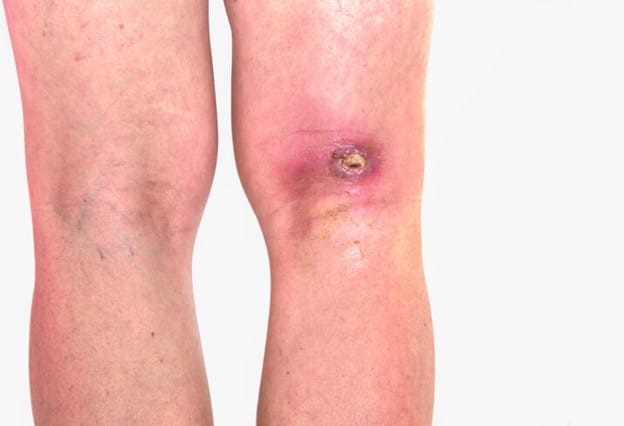What Are the Most Effective Non-Healing Wound Solutions?
A chronic wound can affect your ability to move around easily, work, exercise, or enjoy your hobbies. Complications from chronic wounds can be far-reaching and permanent, eventually affecting every aspect of your life. Without professional intervention, you are more likely to develop complications.
Working with a chronic wound care specialist (CWS) can help you better understand your risk factors for chronic wounds, how to manage and prevent chronic wounds, and how to properly care for chronic wounds. CWS have extensive education, training, and experience in chronic wound therapies and finding innovative non-healing wound solutions. Here is a look at what a non-healing wound is, who is most at risk, and finding the most effective non-healing wound solutions in Portland, OR; Los Angeles, CA; Vancouver, WA; or Nashville, TN.
What Is a Non-Healing Wound?
A non-healing wound is also called a chronic wound. It is a wound that doesn’t heal in the expected time frame. Non-healing wounds increase your risk of infection and other complications that can cause chronic health issues and even death. When you work with a certified wound care specialist, they can quickly assess the severity of your wound, classify its healing stage, evaluate factors that could be contributing to slow wound healing and design a comprehensive, advanced wound care treatment plan.
Who Is at Risk for Chronic or Non-Healing Wounds
You might be at risk of a chronic or non-healing wound if you have an underlying health condition or certain lifestyle factors that affect your mobility, diet, weight, or nutrition. Your physician or a wound care specialist can help you understand your risk level for developing a chronic wound so that you can take the necessary steps to reduce your risk. The most common risk factors for chronic wounds are:
- Diabetes – Severe or unmanaged diabetes is the biggest risk factor for chronic, slow-healing, or non-healing wounds. Diabetes complications like consistently high blood glucose levels, obesity, a sedentary lifestyle, poor circulation, and neuropathy can all increase the risk of a diabetic ulcer or chronic wound.
- Ischemia – Ischemia is a condition that reduces blood flow to certain parts of the body. This can inhibit the delivery of oxygen and nutrients to injured areas and slow healing.
- Vascular Disease – Peripheral artery disease and other conditions that cause poor blood flow can prevent oxygen and nutrients from getting to a wound, which can slow or prevent healing.
- Obesity – Excess weight can put added pressure on your soft tissues, which can impede blood flow, slow circulation, and affect wound healing.
- Immobility or a Sedentary Lifestyle – When you are regularly immobile or have a sedentary lifestyle, you may also have poor circulation and obesity. Immobility can lead to pressure ulcers, which can be slow to heal due to poor circulation and other contributing factors.
- Nicotine Use – Nicotine can constrict blood vessels and affect circulation, which contribute to slow wound healing.
- Substance Overuse or Alcohol Overuse – Overuse of alcohol or other substances can contribute to health conditions and lifestyle factors that increase the risk of non-healing wounds. Substance overuse and alcohol overuse can increase your risk of a poor diet, malnutrition, a sedentary lifestyle, and developing injuries you might not immediately be aware of.
- Poor Diet or Malnutrition – Poor diet can contribute to or exacerbate health conditions that increase your risk of chronic wounds, such as obesity and diabetes. Malnutrition can limit your absorption of essential vitamins and nutrients that are crucial for wound healing. A lack of protein and vitamin C can significantly impair wound healing.
- Medication Use – Some prescription medications can affect wound healing. Corticosteroids suppress the immune system, which can make wounds slow to heal.
Recognizing Symptoms of Non-Healing Wounds
If you are able to recognize early warning signs of non-healing wounds, you may be able to prevent complications like infection. A wound care specialist can assess your wound, determine what factors are preventing healing, provide specialized wound care services, and help you prevent complications. The most common symptoms of non-healing wounds are:
- Increased pain or discomfort, especially when moving the injured area, cleaning it, or applying pressure
- Increased inflammation or puffy, swollen, red, or discolored tissue around the wound
- Despite home wound care and over-the-counter pain medication, the wound either remains the same or gets worse
- The wound is leaking or has a cloudy or foul-smelling discharge
- The edges of the wound begin to change color and may appear blue, black, purple, white, red, or green
- You experience symptoms of an infection, including red, puffy, itchy or tight skin; red streaks leading from the wound; pus or discharge; problems moving the affected area; loss of mobility; fever; body aches and pains or joint aches; loss of appetite; vomiting or nausea; diarrhea; or intense fatigue or loss of consciousness
Most Effective Chronic Wound Therapies and Treatments
Your certified wound care specialist will assess your wound and determine what underlying issues are affecting the healing process. They will then create an individualized chronic wound therapy program that is designed to relieve pain and discomfort, treat or prevent infection, reduce the risk of complications, and accelerate healing. The most effective non-healing wound solutions are:
- Wound Cleaning and Debridement – Before any other treatment can begin, your CWS must ensure your wound is clean. They may use a specialized wound cleanser, like a saline solution, to flush out the wound. They may also perform debridement, which is the removal of dead or inflamed tissue using tweezers or a scalpel.
- Wound Dressings – Wound dressings can protect the wound from bacteria, relieve pain, improve circulation, and keep the wound clean and moist. Your CWS will apply dressings and instruct you and/or your caregiver on proper dressing changing procedures.
- Compression Therapy – Some chronic wounds benefit from the use of compression therapy to improve circulation. Poor circulation can prevent your body from delivering oxygen and nutrients to the wound, which can delay or prevent healing. Medical socks or bandages can improve circulation and accelerate recovery and healing.
- Antibiotics and Ointments – If your wound is infected or is in danger of infection, you may need antibiotics. Antibiotics kill bacteria and can prevent it from spreading to your bloodstream. Your CWS may also recommend soothing or healing ointments that can address symptoms like tight, dry, itchy skin, and pain.
- Negative Pressure Wound Therapy – Negative pressure wound therapy or vacuum-assisted closure can accelerate healing for chronic wounds. The pressure device draws fluid out of the wound and reduces inflammation, which can help the wound close.
- Hyperbaric Oxygen Therapy – Hyperbaric oxygen therapy can accelerate healing, treat or prevent infection, and promote healthy cell and tissue growth. During HBOT, you will sit in a special chamber and will be administered 100% pure oxygen through a mask.
- Diet and Lifestyle Changes – If you have an unmanaged underlying health condition that is affecting the wound healing process or causing complications, your CWS and healthcare team may recommend that you make specific diet and lifestyle changes. Diet and lifestyle changes can improve your overall health and wellness and give your body the energy and fuel it needs to heal. You may need to eat healthier, take vitamins and supplements, eat more protein, drink more water, get more exercise, and avoid the use of nicotine and alcohol.
Benefits of Professional Chronic Wound Treatment
When you work with a wound care specialist, they can help you explore the most effective chronic wound therapies and create a highly individualized, advanced wound care treatment program. CWS have extensive education and training and know how to assess, treat, and manage chronic or non-healing wounds. They use state-of-the-art technology and modern wound care innovations to advance and accelerate healing, reduce the risk of complications, and improve quality of life. The biggest benefits of working with a CWS for chronic wound treatment are:
- Expert assessment of your wound and identification of complications or potential complications
- Evaluation of underlying factors that are preventing wound healing
- Creation of a personalized chronic wound treatment plan
- Use of effective pain management strategies to improve comfort and overall health and wellness
- Collaborative care with your physician, caregiver, and other members of your care team
- Implementation of state-of-the-art technology and advanced wound care treatments
- Early detection of infection and establishment of infection prevention strategies
- Education and instruction on proper wound care techniques
- Improved health and wellness and quality of life
Schedule a Consultation for Chronic Wound Therapy
At BH Wound Care, we offer personalized care and comprehensive treatment for non-healing wounds. We can assess your wound and determine what underlying factors are affecting the healing process. We can also evaluate your wound for signs of infection or other complications. We will then work closely with you and your care team to create a collaborative care plan that relieves pain and discomfort, promotes wound healing, reduces the risk of infection, and helps you take better control of your overall health and wellness.
We provide personalized chronic wound therapies in Portland, OR; Los Angeles, CA; Vancouver, WA; and Nashville, TN, and work with patients in their homes or at assisted living, long-term care, and memory care facilities. Call us now or reach out to us online to schedule a consultation or professional wound assessment.


